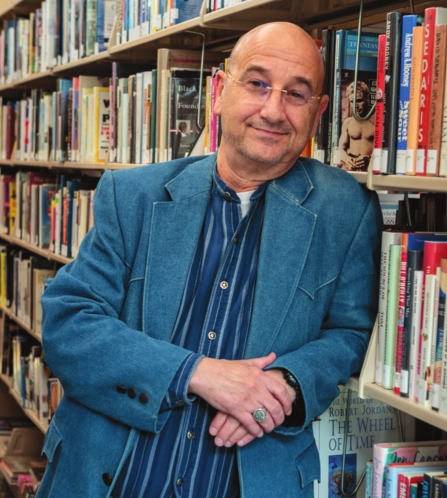Joe Todaro’s Dramatic Life On and Offstage

Joe Todaro framing his life in theater.
Local actor achieves 100th theatrical production
In his play “As You Like It,” William Shakespeare wrote, “All the world’s a stage and all the men and women merely players.”
Local thespian Joe Todaro has been actively involved in community theater for many years and in December achieved a personal milestone: his 100th theatrical production.
Todaro has served community theater in various ways, not just as an actor but also offstage as a director, stage manager, lighting worker and sound man. His on-stage work runs the gamut from comedy to drama to musicals, from walk-on roles to supporting roles to leads. His last job was working sound and performing various roles in the radio show version of “It’s a Wonderful Life” in Jefferson, Texas.
How did he become involved in theater? In 1991, “I was production manager at KTAL, and Seva May and Bob Buseick got in a jam needing to do a promo for ‘Man of La Mancha.’ They usually did all of their stuff at Channel 3, but there was a scheduling problem, so they called me and said, ‘Could you do it?’” he said.
He could and did. Buseick then asked Todaro if he ever thought about doing theater. Todaro jokingly told him, “No, I’m content to starve in television.” Buseick promptly asked him to come and audition for a show. Since Seva May was already one of his customers, Todaro thought, “If I don’t do it, she won’t come back.” He chuckled.
Although he had never done theater before, Todaro accepted the invitation, “and Buseick, I swear, sandbagged me because he didn’t audition anybody else for the butler in a production of ‘The Royal Family.’ He ended up “really liking it.” “It was a sort of a good outlet for me,” he said. “It was a time in my life when I didn’t have a lot of creative outlets, and when you’re a production manager in a commercial production facility, you have to deal with the client. You still have to do that with the author of a play, but there’s an interpretation, and it’s very difficult to get your creative juices going sometimes.”
A string of shows soon followed at Marjorie Lyons Playhouse.
So what was the attraction of the theater for Todaro? “People don’t understand that not everybody that does theater wants to be a star,” he said, adding that he had no illusions of making it to Broadway or even Hollywood. “What I really enjoy about it is getting the opportunity to entertain people for two hours. You know, life is a pain in the neck, and if you have the opportunity to make people forget about their busted furnace or the transmission going out … and make them laugh, to me that’s what it’s all about. I don’t have any real ego when it comes to that, and that’s hard for people to accept. I’ve done shows where I don’t take a curtain call because to me that’s like saying, ‘Look at me,’” although he will meet with the public after a show to thank them for supporting the theater.
His first theater experience, he said, was not much different from television. “It was an outlet for me to get some of my personal stress out, because you can say things on stage you would never get away with in real life,” Todaro said.

Over the last 30-plus years, Todaro has worked in virtually all aspects of theater on stage and off. Which facet of theater gives him the most satisfaction? “There’s two answers to that question, and one is acting,’” he said, “because you get to take somebody’s idea of what a character should be and create your version of it. But directing … my mother was a teacher, and I kind of have always been a teacher — I taught at Centenary. And being a director is like being a teacher. It’s like being the main audience member. … And to watch people take the material and make something good out of it is fulfilling. So I like directing.”
What type of roles or show does he enjoy working on as an actor or director? His answer is to the point: “Comedy is my wheelhouse,” he said. “I love comedy, mostly because I’m a smart-aleck, and like I said before, finding a way to make people laugh or forget their problems, there’s no better way than comedy.”
When asked what some his notable experiences were in theater, he mentioned a couple of roles he had performed in the past, such as Marcellus in “The Music Man,” in which he adopted Buddy Hackett’s intonation of the character from the movie version, and as one of the two gangsters in “Kiss Me, Kate,” “and it was the death of me because Ginger Folmer choreographed that.” One night, the actor playing his fellow gangster could not make the rehearsal, and Todaro spent the next three hours alone with the hardworking Folmer. “I had a fairly new pair of shoes that weren’t new by the time we were through.” He laughed at the memory.
As a director, Todaro enjoyed working on “Nunsense,” which he called one of his most fulfilling moments. He recalled how one actress belted out the song “Anthem,” “and I swear to you, it was like Sunday morning at the First Antioch Baptist Church.”

Joe Todaro has served as a director and an actor.
Now, Todaro has hit a personal milestone of having worked in some capacity in 100 shows, but he downplays that achievement. “There are probably half a dozen people that have done more than I’ve done,” he said. “Bobby Darrow, I think, was 7 when he did his first show; he’s bound to have done this many.
“It’s not a milestone as far as the theatrical world is concerned, but it is for me because it was always part-time.”
Todaro said, “I think the most important thing for people to understand, though, is that community theater is that: It is community. It is people of all sorts of talent levels and experience levels and aspirations and ego levels and the whole nine yards. As long as you can agree to put in the work, you’re going to have fun. And that’s the whole point of doing it, even if you’ve never done anything.”
What does Todaro ultimately get out of his theater work? “My standard question for people when they walk into the lobby after the show is ‘Did you have fun?’ To me, that is the touchstone. If people had fun, if they enjoyed the show, if they were glad they came, then that’s what’s important.”
